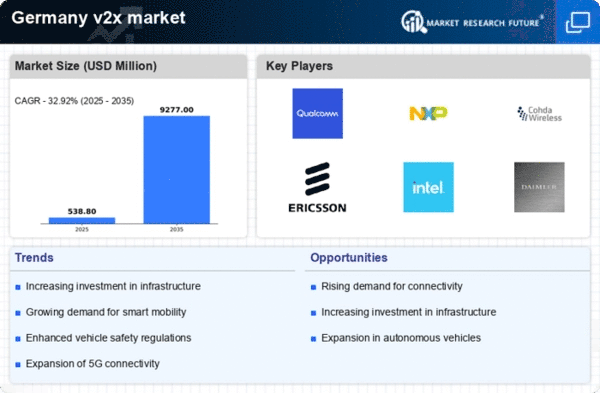Public-Private Partnerships in Mobility
Public-private partnerships (PPPs) are emerging as a key driver for the v2x market in Germany. These collaborations between government entities and private companies are essential for funding and implementing innovative mobility solutions. The German government has initiated several PPP projects aimed at enhancing urban mobility through v2x technologies. For instance, a recent initiative in Berlin focuses on integrating v2x systems into public transport networks, which could potentially improve service efficiency by 25%. Such partnerships not only facilitate the sharing of resources but also encourage the development of new business models, thereby accelerating the growth of the v2x market.
Technological Advancements in Communication
The v2x market in Germany is experiencing a surge due to rapid technological advancements in communication systems. Innovations such as 5G networks are enhancing vehicle-to-everything communication, enabling real-time data exchange between vehicles, infrastructure, and pedestrians. This connectivity is crucial for the development of autonomous vehicles and smart city initiatives. As of 2025, the German government has allocated approximately €1 billion to support the deployment of 5G infrastructure, which is expected to significantly boost the v2x market. Furthermore, the integration of advanced sensors and AI technologies is likely to improve traffic management and reduce accidents, thereby increasing the attractiveness of v2x solutions for both consumers and businesses.
Increased Focus on Data Privacy and Security
As the v2x market in Germany expands, there is a heightened focus on data privacy and security. With the proliferation of connected vehicles, concerns regarding data breaches and unauthorized access to sensitive information are becoming more pronounced. The German government is actively working on regulations to ensure that data collected through v2x systems is protected. This regulatory framework is expected to instill confidence among consumers and businesses, potentially increasing market adoption rates. By 2025, it is anticipated that compliance with these regulations will be a prerequisite for v2x market participants, thereby shaping the competitive landscape and driving innovation in secure communication technologies.
Rising Environmental Awareness and Regulations
The v2x market in Germany is significantly influenced by rising environmental awareness and stringent regulations aimed at reducing carbon emissions. The German government has set ambitious targets to cut greenhouse gas emissions by 55% by 2030, which necessitates the adoption of cleaner transportation technologies. V2x solutions are seen as pivotal in achieving these goals by optimizing traffic flow and reducing idle times, which can lead to lower emissions. The market for electric vehicles, which often incorporate v2x technologies, is projected to grow by 40% annually through 2027. This alignment of environmental objectives with technological advancements is likely to propel the v2x market forward.
Growing Demand for Smart Transportation Solutions
The v2x market in Germany is driven by an increasing demand for smart transportation solutions. Urbanization and population growth have led to congested roadways, prompting the need for efficient traffic management systems. The German government aims to reduce traffic congestion by 30% by 2030, which may be facilitated through the implementation of v2x technologies. The market for smart transportation is projected to reach €5 billion by 2026, indicating a robust growth trajectory. This demand is further fueled by the need for sustainable mobility solutions that align with Germany's environmental goals, making v2x technologies an attractive option for municipalities and private enterprises alike.















